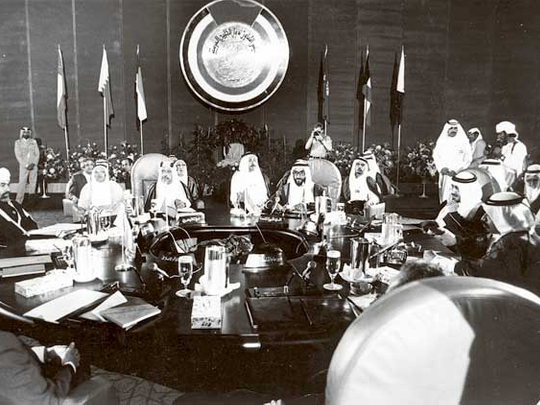
Dubai: The dramatic shifts in regional politics after the interim nuclear deal with Iran, and the very dangerous fall out from the Syrian civil war are two major issues that the six-member Gulf Cooperation Council (GCC) need to discuss urgently in their unusually important annual two-day summit which starts on Tuesday in Kuwait.
The GCC was founded in 1981 as the six Gulf states (Saudi Arabia, Kuwait, Bahrain, Qatar, UAE and Oman) sought strength through mutual security in the light of the vicious Iran-Iraq war which raged for the better part of that whole decade.
It never really succeeded as a political or economic union, but has remained a club of like-minded states that are willing to act in concert when required.
Top of their agenda this week will be how they should react to the recent nuclear agreement between Iran and P5+1 (US, UK, France, Russia, China and Germany). Saudi Arabia has led the charge in accusing the US of wanting to desert its long-time Arab allies in the Gulf as it develops a new friendship with Iran.
The GCC wants to be included in the P5+1 talks, and although that seems unlikely what may happen is for the P5+1 to set up some kind of forum which would be limited to sharing documents and information, so that the P5+1 and the GCC are sure that they all mutually aware of everything that is being discussed.
Such a forum might be useful since what irritated both the Saudis and other GCC members was being excluded from the talks which combined with an obvious lack of briefing led to suspicions that the US was going to make some kind of bilateral deal with Iran that might not take into account GCC fears of Iran’s political adventurism in GCC and other neighbouring states.
Talking at the Manama Dialogue in Bahrain earlier this week, US Defence Secretary Chuck Hagel was blunt that the US valued its Arab allies highly and saw no diminution in their relationship.
In fact, he proposed that the GCC and the US defence ministers should hold an annual ministerial conference so that they all remain aware of each others priorities and can coordinate the existing bilateral arrangements that the US has with each GCC state.
The collapse of the Syrian state and the slow spread of violence into Syria’s neighbours are another major concern.
Saudi Arabia and Qatar led the region in supporting the secular opposition in Syria, and are furious that the US and the international community did not step up to support the opposition, which allowed the extremists of Al Qaida and its allies to start to dominate the opposition, which deeply worries the GCC.
At this weeks’ summit they will be working hard to find a mechanism to encourage the secular opposition and reduce the influence of the religious extremists.
Union or not?
Internal GCC reform will be a major issue at this week’s summit. The Saudis have revived an earlier proposal to deepen the GCC from its present loose organisation into much tighter and more coherent political union. Saudi Foreign Minister Nizar Madani startled the Manama Dialogue earlier this week when he called for a “reform of the current identity of the GGG to include a consensus of vision and joint strategy”.
He also added that the reformed and deepened GCC “should work as a matter of force not weakness”, in a reference to developing a more strident military stance in the region that thoroughly alarmed the Omani Foreign Minister Yousuf Bin Alawi who rejected outright the Saudi proposal, saying that there is no agreement to changing the GCC into a Union, and the idea is simply a Saudi proposal. Later he went so far as to say that if the Union goes ahead Oman would review its membership of the GCC.
Today’s summit will also take a vote on setting up a single Gulf currency even though the UAE and Oman have said that they will not support such a move.
The idea has been mooted for some time, and the four members look likely to go ahead despite their partners’ reservations. Since all GCC states have largely (or totally) pegged their currencies to the dollar their will be minimal currency confusion if the move does go ahead.
If the four members go ahead with their single currency, it will be the first move towards economic union for many years, as GCC customs union has not taken off and there are many barriers to trade across the six nations as some prefer more protectionism, and others more open market policies.
Islands
As the summit debates its future relationship with Iran, the GCC leaders are bound to call for the end of the Iranian occupation of the three UAE islands of Abu Musa, and the Greater and Lesser Tunbs.
Iran has illegally occupied the islands for decades which is one example of its political adventuring into the sovereign affairs of its neighbours, which is why the GCC states are so suspicious of the emerging rapprochement with Iran.
Other examples or Iran’s interference include its backing for the Al Assad regime in Syria, several Iraqi Shiite militias, its malicious support for the opposition in Bahrain, and its backing for the Houthis in north Yemen.












